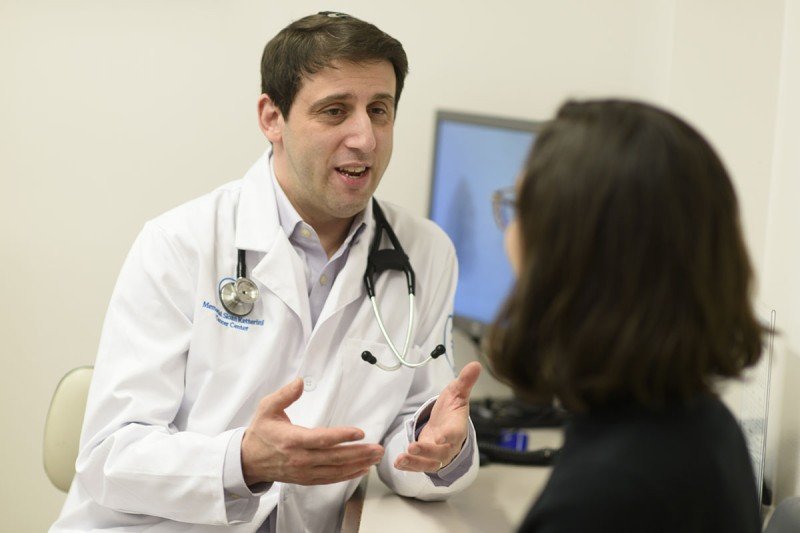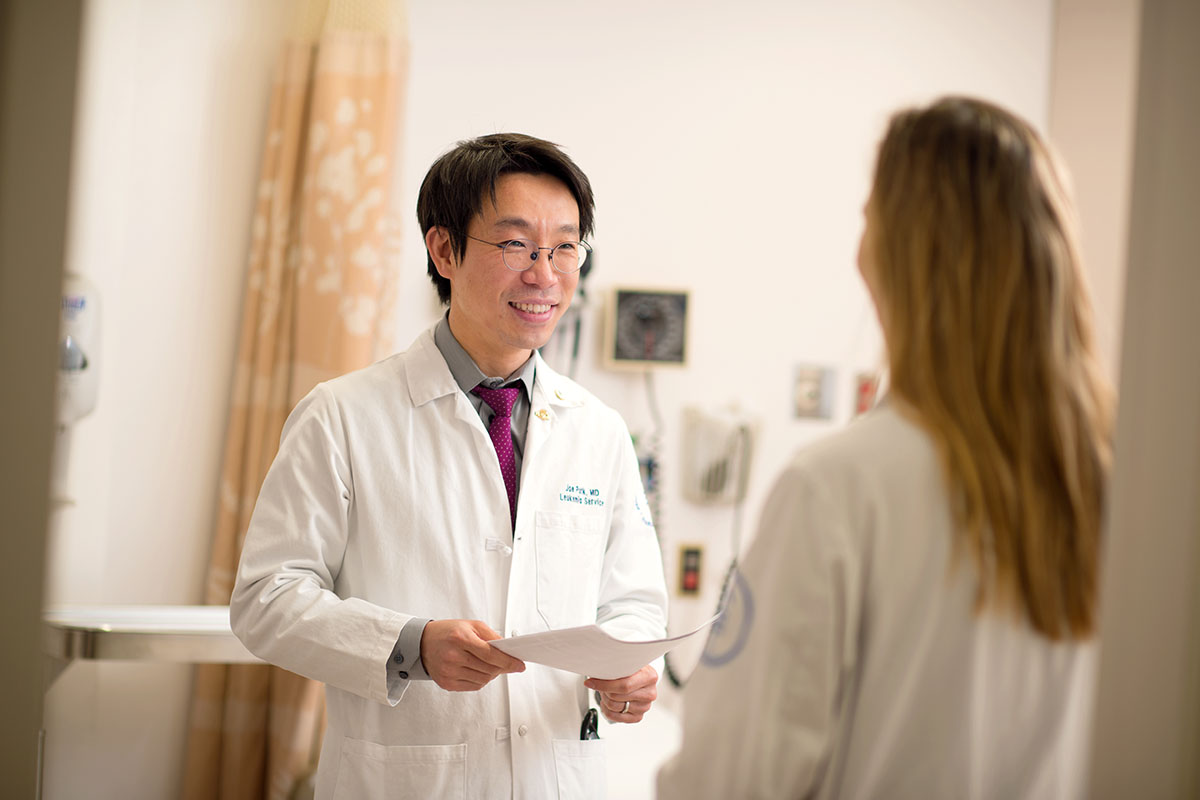
On September 3, Memorial Sloan Kettering launched the Program for Drug Development in Leukemia (PDD-L). This new program will focus on creating more phase I clinical trials for most types of leukemia in adults. Its goal is to rapidly bring novel therapies to people being treated at MSK.
We spoke to leukemia experts Eytan Stein, who will lead the new program, and Jae Park about how treatment for acute (fast-growing) leukemia has changed in the past few years. They shared their ideas on how this new program will further accelerate improvements in treating these blood cancers.
Dr. Stein specializes in treating acute myeloid leukemia (AML), one of the most common leukemias in adults. Dr. Park specializes in treating acute lymphocytic leukemia (ALL). This blood cancer is rare in adults but makes up three-quarters of leukemia in children.
How have treatments for leukemia changed over the past few years?
Dr. Park: For ALL in adults, one of the big improvements is the development of new immunotherapies, including blinatumomab (Blincyto®) and inotuzumab (Besponsa®). Blinatumomab is an antibody-based drug that works by linking T cells to leukemia cells. This enhances the T cells’ killing activity. Inotuzumab is an antibody with a drug attached, to allow the selective delivery of chemotherapy to leukemia cells. Both drugs have fewer side effects than chemotherapy. This is important because ALL is often diagnosed in older people, who may not be able to tolerate stronger drugs.
Dr. Stein: For AML, we have moved away from a one-size-fits-all approach, which was common for decades. As with ALL, people with AML tend to be older and therefore not strong enough for intensive chemotherapy. Now we have other options. One is a drug called venetoclax (Venclexta®), which targets a protein on leukemia cells called BCL2. The drug is given with another type of drug, called a hypomethylating agent, which affects cellular function. This combination treatment leads to remission in about 70% of people with AML, and those remissions tend to be long-lasting.
How has personalized medicine improved the treatment of leukemia?
Dr. Park: We’ve learned that about 40% of all cases of ALL have a genetic abnormality called the Philadelphia chromosome. This mutation is also commonly found in chronic myeloid leukemia. We’ve found that drugs that target the mutation also work for ALL, but they need to be combined with other drugs. We are now doing clinical trials to find the best combination for these drugs and are also using MSK-IMPACT™ to look for less-common mutations that can be targeted with different drugs.
Dr. Stein: For the 30% of people who don’t respond to the venetoclax combination or whose disease comes back after treatment, we have many options based on the mutations driving the cancer. For the approximately one-quarter of people who have mutations in the genes IDH2 and IDH1, the US Food and Drug Administration recently approved the drugs enasidenib (Idhifa®) and ivosidenib (Tibsovo®), respectively. We are looking at adding targeted therapies for other mutations as well. For people with secondary AML, which develops after they have been treated for myelodysplastic syndrome or another cancer, a new drug that is a formulation of two older chemotherapies together seems to be effective.
What are the roles of blood and marrow stem cell transplantation and cell therapies, like chimeric antigen receptor (CAR) T therapy, in treating people with acute leukemia?
Dr. Park: For people with high-risk ALL or those whose disease comes back after chemotherapy, bone marrow transplantation has been the only chance of a cure. More recently, a new and improved form of cell therapy called CAR T has emerged as a promising treatment to achieve a deep and complete remission even in people who have failed all standard therapies, including bone marrow transplantation. This has generated a lot of excitement in the field. MSK is leading the effort to develop effective and safe CAR T cells for people with various blood cancers. What is most exciting about this form of cell therapy is that a single infusion of T cells can result in a long-lasting remission. With continued commitment and research in the field, we are optimistic that we will improve the outcome and quality of life of people with blood cancer.

What are you most enthusiastic about?
Dr. Stein: I’m excited about all of our clinical trials, specifically the phase I trials that the PDD-L is putting forward. We hope to eventually have a trial available for every patient who doesn’t respond to standard treatment. MSK is also a founding member of the Beat AML initiative overseen by the Leukemia and Lymphoma Society. Through these efforts, we want to have a clinical trial available for every individual who doesn’t respond to standard treatment.
Dr. Park: I’m excited about all the new treatment options for all people with ALL. In the next few years, we will focus our efforts on how to best use these therapies to minimize exposure to traditional chemotherapy and shorten the duration of therapies for people with ALL, which currently last several years. We hope to achieve these goals through a series of clinical trials. We’ll use sophisticated tools to detect an extremely low level of leukemia cells, called measurable residual disease, and identify who can benefit from these new therapies.
Beyond the hematologic oncologists, who are the other members of the MSK team that contribute to the care of people with leukemia?
Dr. Stein: Our molecular pathologists and hematopathologists make it possible for us to find the genetic mutations in each patient’s cancer so that we can match them with the right therapy. This kind of testing used to take many weeks, but now they are able to get us results within a few days. It enables us to get patients on trials right away so they can start treatment almost immediately.
Dr. Park: Our nursing staff on the Leukemia Service is phenomenal, and they’re a big reason to come to MSK. They have incredible experience in managing the side effects that may come from the newly approved and experimental therapies. They also understand the emotional and social needs that often come with a diagnosis of leukemia. Because of their expertise and support, we can ensure that most patients will complete their cancer treatments. Effective leukemia treatment requires strong teamwork, and we have an amazing team that I’m proud to work with every day.
Where is the PDD-L located?
Dr. Stein: People who participate in trials through the PDD-L will receive their care in the new David H. Koch Center for Cancer Care. Their treatment is provided within the Developmental Therapeutics Unit, a treatment area with a specialized cadre of nurses who have expertise in the care of people on phase I clinical trials.
To learn about trials in the PDD-L, call 646-608-3749.





